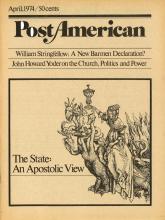Those of us who hold positions of leadership and the people whom we represent must confront these tragic affairs and learn their meaning for us as a nation. These are not matters that can be covered up in the hope they will be forgotten, even though it is always easier to hide our wounds than to heal them.
It is more comfortable to believe in the spiritual symbols of righteousness than to acknowledge the reality and presence of evil in ourselves and in our corporate life. So we become adroit at manipulating religious impulses in our land to sanctify national life.
We tend to put our country beyond the reach of God’s judgment. The words on the back of our Great Seal read, “God hath ordained our undertakings.” Our money is emblazoned with “In God We Trust.” Our leaders solemnly invoke the name of God in their political speeches. We earnestly want to believe that ours is God’s chosen land; that we are his chosen people, and that the leaders we have are divinely chosen and given special wisdom.
Read the Full Article

